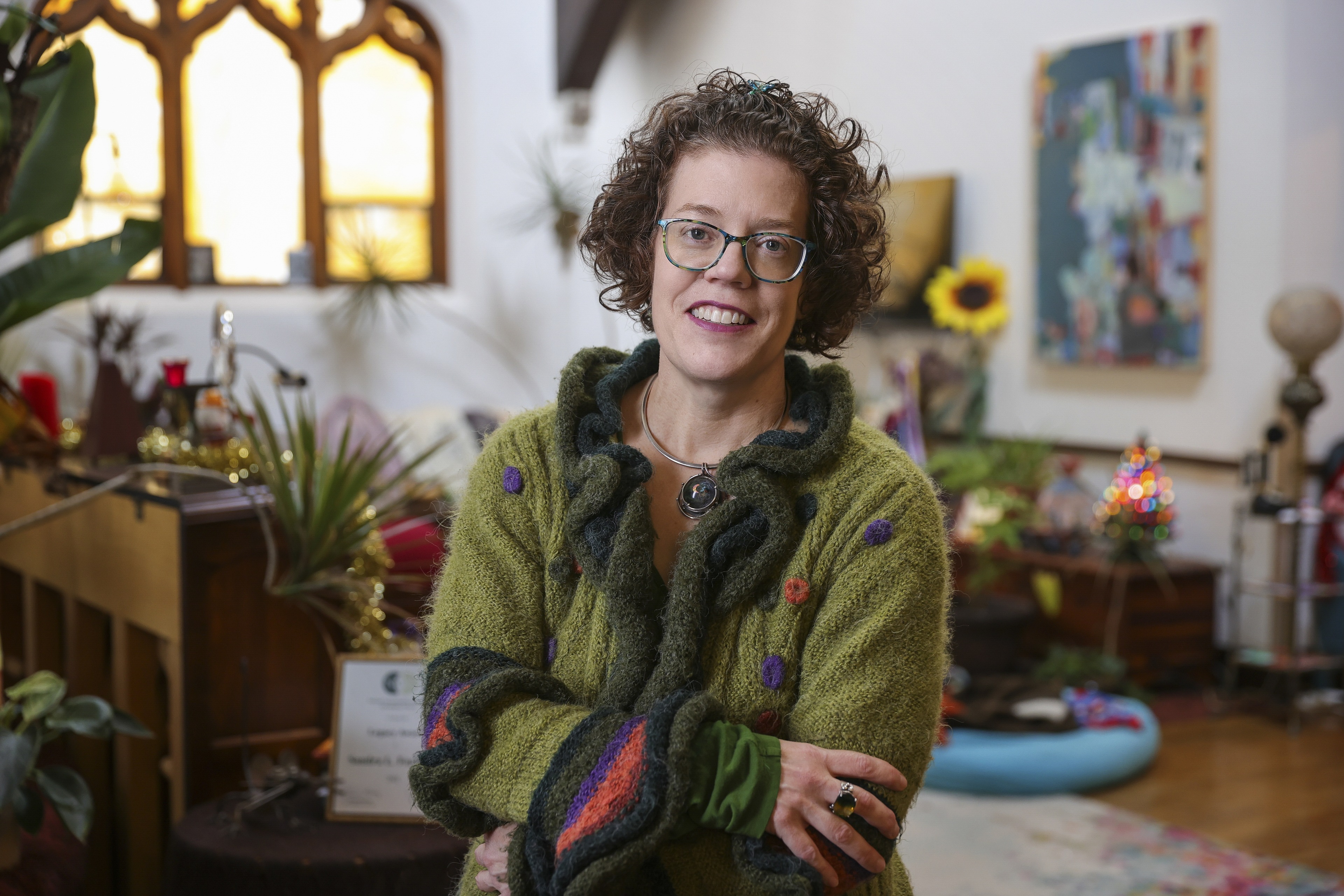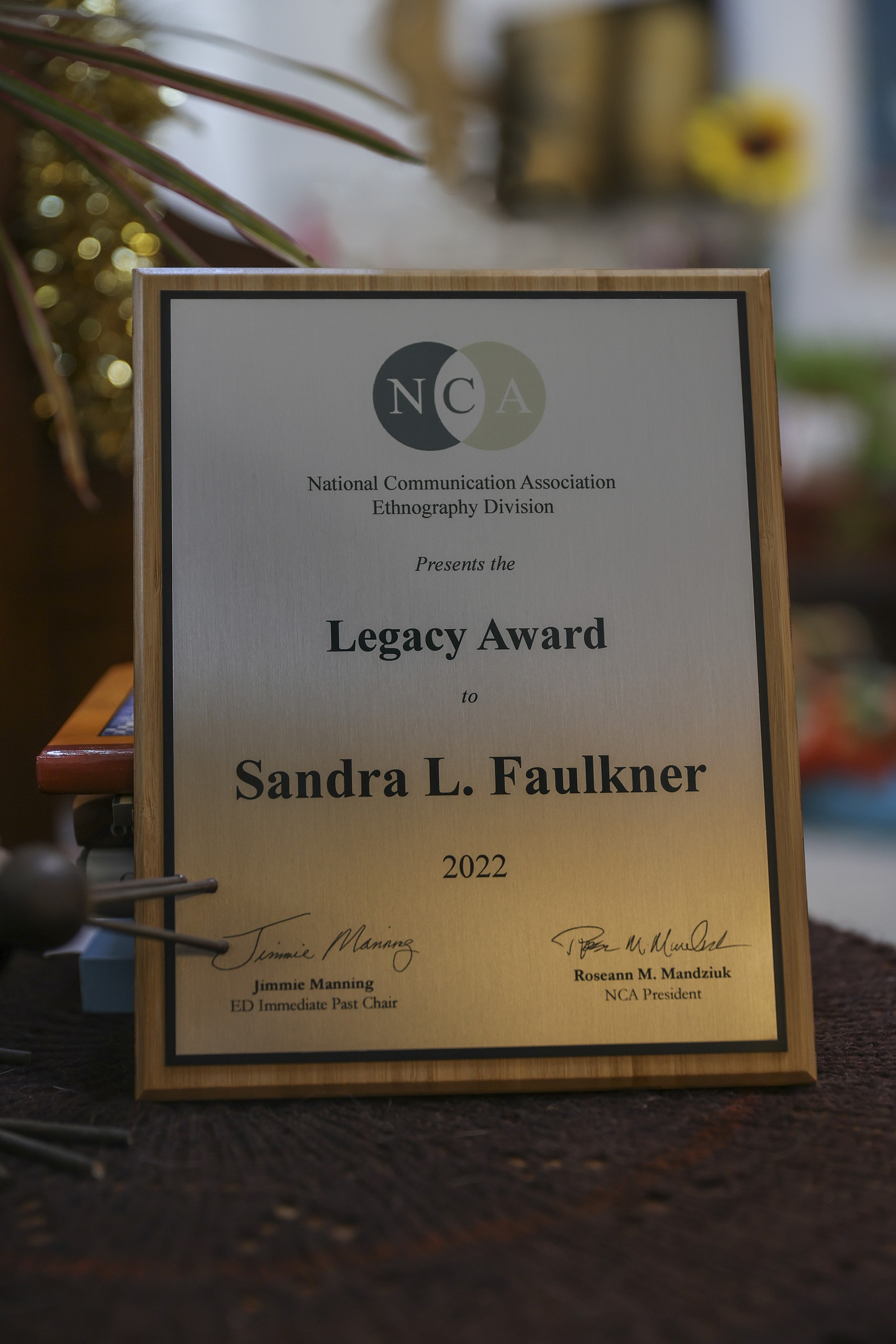
National Communication Association bestows Legacy Award upon BGSU professor
Dr. Sandra Faulkner was honored for her substantial contributions to ethnography in communication studies
By Victoria Dugger
The work of Bowling Green State University professor of media and communication studies Dr. Sandra Faulkner in poetic inquiry shows that research is not devoid of feeling but has an emotional side, too. Poetic inquiry allows the observer to feel and embody an otherwise unknown experience and even has the power to shift perspectives into policy that can work toward the public good.
Faulker’s groundbreaking philosophies and instruction of poetic inquiry – a qualitative, arts-based research methodology that cuts across disciplines to present the human experience – were recently recognized by the National Communication Association’s Ethnography Division. She was honored with the Legacy Award during the association’s annual convention in New Orleans in November. The Legacy Award honors scholars who are 20 years or more past their terminal degree and who have made a substantial contribution to ethnographic work in communication studies and beyond.
Poetic inquiry involves creating poems or poem-like prose from qualitative interview data. Faulkner quite literally wrote the book on the practice, with her “Poetic Inquiry: Craft, Method, and Practice” winning an honorable mention in the International Congress of Qualitative Inquiry’s 2021 Best Book Award.

With this style of research, people are treated and seen as humans, not reduced to a dataset of numbers or trends, which can enhance cross-cultural, cross-generational and multi-gender understanding by embodying experiences.
As a social scientist, Faulkner explains that she uses poetry and poetic inquiry in both research and teaching practices.
“You can analyze poetry, you can present some of your research findings in poetry or maybe you just write poems as part of a reflexive practice, which may or may not get published but just to help you understand or to feel that that issue or that group of people that you are studying,” she said.
At BGSU, students working with Faulkner have engaged in dialogues about race in close relationships, dialogued with older adults in long-term care facilities, created poetic portraits of older adults based on life history interviews about their relationships throughout life, designed sexual health campaigns, and conducted oral histories for their local communities.
Faulkner’s students at BGSU take part in this research through relational communication and poetic inquiry to interpret and represent their research subjects. Recently, her students paired with BGSU gerontology associate professor Dr. Wendy Watson to interview older women in the Bowling Green area about their relationships across their life courses.
“Either Wendy or I were interviewing the women and then there would be one student in each interview from my graduate research methods class who sat in and would observe and could also ask questions,” Faulkner said. “At the end, the students presented the women's stories in a series of poems that we call a poetic portrait. We walked them through taking a transcript from an interview and seeing how you can create poems from that.”
The poetic portraits were gifted back to the storytellers during a celebration at the Wood County Senior Center, and the students could see the emotional impact of using poetry to relay the experiences the older women had during their lives.
“It was a learning tool for students to see what poetry can do that other forms can't,” Faulkner said. “That's what I was trying to get them to see. They could have presented their findings in a traditional prose form; it could have been traditional research. But I think poetry is really good for capturing emotion. I also think it's really good for when you're looking at identity because it's nuanced like poetry.”
Faulkner has been with BGSU since 2007 and lauds the support of colleagues and outreach opportunities she’s experienced since her arrival.
“The students have been really supportive and so have the colleagues here. BGSU has been a great place for me, and I've gotten to do several community engagement projects and have received support for that,” she said. “I like it here. It’s been a great 16 years, and I’ve been really supported in this work.”

The emotion of poetry and poetic inquiry also works to quickly gain notice and understanding – which is crucial in a world with shortened attention spans and widened cultural divides. Rather than being too busy for or intolerant of poetry, Faulkner said students embrace the forms available in digital formats.
“I can tell from student reactions that they really respond to it now. I had students this past semester who had to write a creative nonfiction piece about a relational concept, so they had to use their own experience to expand upon it,” Faulkner said. “They explored topics like roommate conflict or mother-daughter relationships or father-daughter relationships and quite a few of them wrote poems as part of their project, and they were quite good and meaningful for them.”
The increased understanding of the human experience that poetic inquiry affords also can help to advance the public good by helping to convey a group’s experiences in an emotional way that is hard to capture solely with numbers and hard data, Faulkner said.
“Policy gets created from an emotional appeal and then poetic inquiry empowers people to see the emotions of those who have been marginalized,” she said. “Poetic inquiry helps us to understand people in the context of relational communication. Students respond to those stories and some of them then go out with this knowledge, with certain realizations that they’re going to draw upon and enact policies in their workplaces and keep in mind in close relationships. If they didn't have that human understanding and embodiment connection, they might have just kind of made it through life without thinking of how this could affect other people.
“It’s very valuable, and it just humanizes research. It can be fun - it doesn't have to be boring.”
Related Stories
Media Contact | Michael Bratton | mbratto@bgsu.edu | 419-372-6349
Updated: 02/09/2023 12:34PM




